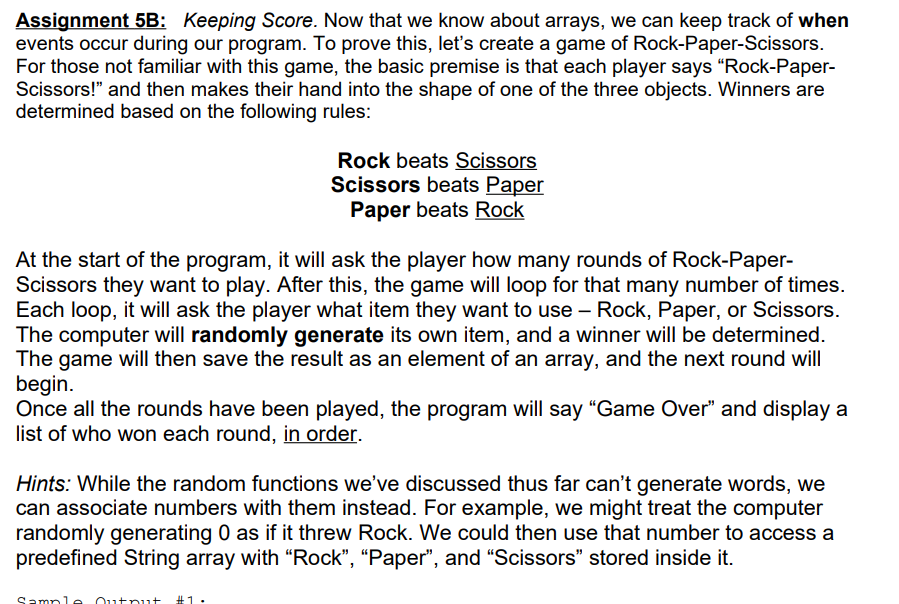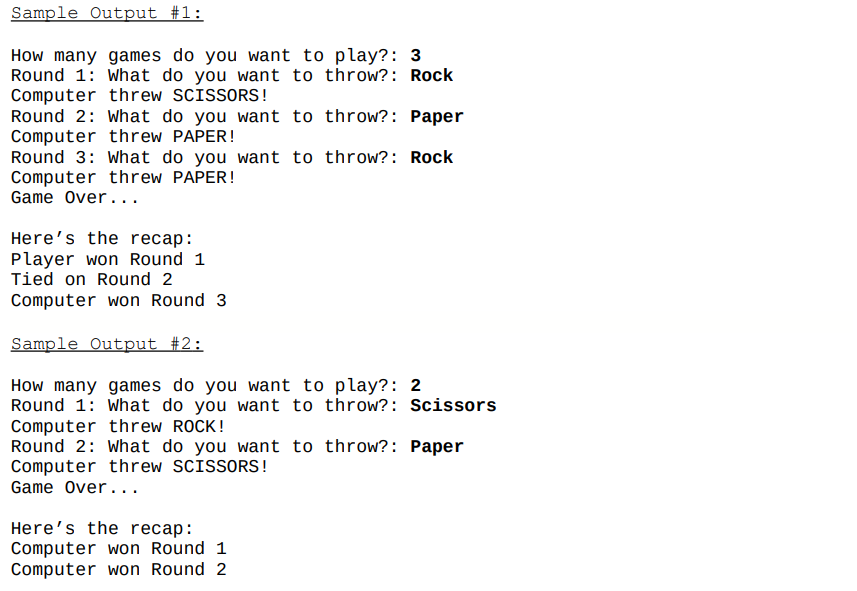c++ using simple parallel arrays and a random number generator. one string should have [rock, paper, scissors] in it and I guess I can use a parallel string with numbers [0, 1, 2] in order to generate a random nnumber 0-2 that correlates to the string with the words in it...
c++ using simple parallel arrays and a random number generator. one string should have [rock, paper, scissors] in it and I guess I can use a parallel string with numbers [0, 1, 2] in order to generate a random nnumber 0-2 that correlates to the string with the words in it...
C++ Programming: From Problem Analysis to Program Design
8th Edition
ISBN:9781337102087
Author:D. S. Malik
Publisher:D. S. Malik
Chapter10: Classes And Data Abstraction
Section: Chapter Questions
Problem 30SA
Related questions
Question
c++ using simple parallel arrays and a random number generator. one string should have [rock, paper, scissors] in it and I guess I can use a parallel string with numbers [0, 1, 2] in order to generate a random nnumber 0-2 that correlates to the string with the words in it...

Transcribed Image Text:Assignment 5B: Keeping Score. Now that we know about arrays, we can keep track of when
events occur during our program. To prove this, let's create a game of Rock-Paper-Scissors.
For those not familiar with this game, the basic premise is that each player says "Rock-Paper-
Scissors!" and then makes their hand into the shape of one of the three objects. Winners are
determined based on the following rules:
Rock beats Scissors
Scissors beats Paper
Paper beats Rock
At the start of the program, it will ask the player how many rounds of Rock-Paper-
Scissors they want to play. After this, the game will loop for that many number of times.
Each loop, it will ask the player what item they want to use – Rock, Paper, or Scissors.
The computer will randomly generate its own item, and a winner will be determined.
The game will then save the result as an element of an array, and the next round will
begin.
Once all the rounds have been played, the program will say "Game Over" and display a
list of who won each round, in order.
Hints: While the random functions we've discussed thus far can't generate words, we
can associate numbers with them instead. For example, we might treat the computer
randomly generating 0 as if it threw Rock. We could then use that number to access a
predefined String array with “Rock", “Paper", and "Scissors" stored inside it.
Sample
Output
#1.

Transcribed Image Text:Sample Output #1:
How many games do you want to play?: 3
Round 1: What do you want to throw?: Rock
Computer threw SCISSORS!
Round 2: What do you want to throw?: Paper
Computer threw PAPER!
Round 3: What do you want to throw?: Rock
Computer threw PAPER!
Game Over...
Here's the recap:
Player won Round 1
Tied on Round 2
Computer won Round 3
Sample Output #2:
How many games do you want to play?: 2
Round 1: What do you want to throw?: Scissors
Computer threw ROCK!
Round 2: What do you want to throw?: Paper
Computer threw SCISSORS!
Game Over...
Here's the recap:
Computer won Round 1
Computer won Round 2
Expert Solution
This question has been solved!
Explore an expertly crafted, step-by-step solution for a thorough understanding of key concepts.
This is a popular solution!
Trending now
This is a popular solution!
Step by step
Solved in 3 steps with 6 images

Recommended textbooks for you

C++ Programming: From Problem Analysis to Program…
Computer Science
ISBN:
9781337102087
Author:
D. S. Malik
Publisher:
Cengage Learning

C++ Programming: From Problem Analysis to Program…
Computer Science
ISBN:
9781337102087
Author:
D. S. Malik
Publisher:
Cengage Learning